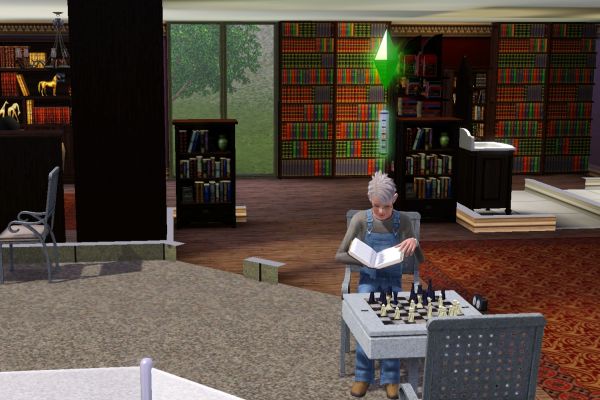
My elderly self-sim again, visiting the library.
Thinking back, my TSI (Happy Science) fanfic are not the only places that my love for books (lots and lots of books) make up a core of my story. I have several magic stories in various states of production where books are central. My Lightwielder stories tend to feature libraries, although they are only instrumental in one of them.
In my Castle Keepers / Living Stones universe, there is a tangent to the Lightwielder universe by the presence of the Songs of the Light, a small easy-to-read book featuring a collection of poems. There is the Commentary on Songs of the Light, which is in 20 heavy tomes, drawing out all kinds of theological and philosophical meanings of the book- Each of these have a commentary in 20 heavy tomes as well, named Commentaries IX on Commentaries VII on Songs of the Light (for an example). These are so heavy in theology and philosophy that they are pretty much unreadable for the untrained reader, and you need to study them all before you can participate in writing commentaries on one of them, which the intellectual and spiritual elite of the land is currently in the process of doing. No obvious allusions to real-world writing, of course!
The most “bibliolatry” of my stories may however be the original 1001st book. In it, those who have voluntarily read 1000 books are offered the 1001st book, which enables them to spend their dreams at night fully conscious in an alternate world where magic is real. The magic is not controlled by emotion or willpower, but by understanding the Sigils. These are very similar to Japanese and Chinese complex characters, with numerous strokes that need to be made in the right place in the right order. But drawing them is the least of the challenge in this imaginary world: The extent to which you can use a magic sigil depends on how deeply you understand it. Thoth, god-king of Attalan (Atlantis), wrote one book for each of the 4000 sigils. Only by reading and deeply understanding such a book can you truly unleash its magic. If you understand it poorly, the magic will be weak, unreliable and may even backfire.
Luckily for all involved in my imaginary lifelong learning of magic, the time spent studying the Lore does not contribute to your aging. So many of the sages reach an age of 175 or even 200 years, having spent over half their lives in the reading and practice of the Art. If only it worked like that in real life! (Actually, there may be a trace of it – sages tend to live to a ripe old age if nothing unfortunate interferes. The reason could be that they are more resistant to Alzheimer’s and other brain damage, due to a better trained brain – or perhaps they started with more brains to begin with. Once your mind goes, it becomes much harder to preserve the body without constant help.)
***
As you can see from all this, my approach to books is mystical and magical. Books are holy, powerful, transformative: They are not tools pointing outward toward the outside world, but are more like medicine or even implements of surgery, pointing inward to alter the very nature of those who read them.
This view of books is based on my own young days and my experience with the Bible and the books of “Smith’s Friends”, the Christian Church I was a part of for many years. Rediscovering to varying degrees the same effect now in my mid-life transformation (which I suppose is in some ways a second puberty), the longing for the Ultimate Bookshelf expresses itself in my fiction as well as in my non-fiction.
Jesus Christ chided (at the very least) the scribes of his time, who pored over books thinking that in them they had eternal life. Jewish Rabbis still tend to do this, and I can certainly sympathize with them. It is a beautiful dream, the more powerful because it is partially true: Books really can change a person. But there are limits, and eternal life is one of those, I guess. There are almost certainly other limitations as well. Except in dreams.
But even with limitations, I suspect I will love books as long as I live.
